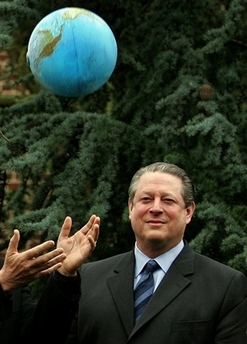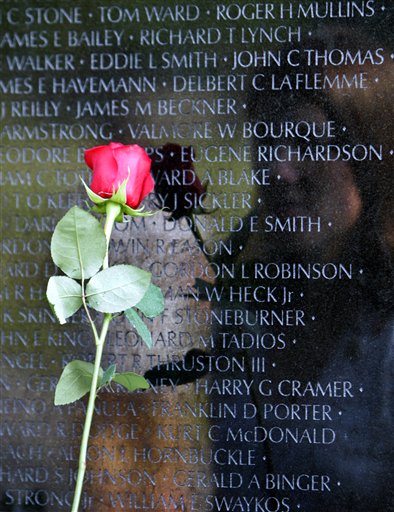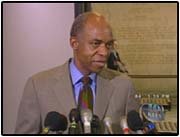WASHINGTON — Attorney General Alberto Gonzales on Tuesday acknowledged that mistakes were made in the firing of top U.S. attorneys and took responsibility following calls for his resignation.
"I accept that responsibility and my pledge to the American people is to find out what went wrong here, to assess accountability and to make improvements so that the mistakes that occurred in this instance do not occur in the future," Gonzales said during a news conference at the Justice Department.
Gonzales responded publicly after repeated calls for his resignation from Democrats and threats of subpoenas to top White House officials to testify before lawmakers on Capitol Hill.
"I've overcome a lot of obstacles in my life to become attorney general. I am here not because I give up, I am here because I learn from my mistakes, because I accept responsibility and because I am committed to doing my job and that is what I intend to do here on behalf of the American people," he said.
Democrats are upset over the firings of eight attorneys announced last December. They believe some of those fired were pressured by leading Republicans to speed up investigations of potential voter fraud involving Democrats.

Sen. Charles Schumer, D-N.Y., who has called former White House counsel Gonzales one of the most political attorneys general in recent history, renewed his call the second time in three days for the attorney general to resign.
"Being attorney general is the one Cabinet officer when the president says, 'jump,' you don't necessarily say, 'how high,' but that is what Attorney General Gonzales has done, over and over again," Schumer said at a press conference on Capitol Hill with Sen. Dianne Feinstein, D-Calif.
Democratic Party Chairman Howard Dean said Gonzales "ought to be shown the door — he ought not to be in this administration. We have got to end corruption in our government. It is not OK to be corrupt."
President Bush stands behind Gonzales, said White House counselor Dan Bartlett.
"The attorney general made the right decision, we support the attorney general in his decision,” Bartlett said at a briefing in Mexico, where Bush is wrapping up a tour of Latin America.
Schumer is leading the Senate probe into the firings and is considering subpoenas for top White House adviser Karl Rove, former White House counsel Harriet Miers and the chief of staff at the Justice Department.
Kyle Sampson, top aide to Gonzales, announced his resignation on Tuesday. Gonzales issued a statement of support for Sampson and thanked him for his service.
Authorities said Sampson failed to brief other senior Justice Department officials of his discussions about the firings with Miers.
Miers asked for feedback on the idea of firing all 93 U.S. attorneys at the start of President Bush's second term, but the Justice Department objected and eventually recommended the eight dismissals that, two years later, have generated a political firestorm.
Gonzales said once he became aware of Miers' idea to get rid of all the U.S. attorneys, "I felt it was a bad idea and it was disruptive."
Senate Judiciary Committee Chairman Patrick Leahy promised that he would call Gonzales, Miers and Sampson to testify before his committee, and he would force them to testify under subpoena if they do not come voluntarily. He said also is considering calling Rove to testify.
Leahy told reporters at a late morning press conference on Capitol Hill that while he was "quite angry" after reading news reports that the administration had not come forward, he was not ready to say whether Gonzales should step down before he has finished his investigation.
"I feel that I want to know the answers to everything in there. I feel that I have not been given all the answers. I feel that matters were held back when they should not have been, and frankly, I find it frustrating and it makes me quite angry. And there will be hearings," Leahy said. 'I've had the briefings [with administration officials]. I didn't get the answers. We'll now have them under oath in an open hearing."
Gonzales said he wanted to ensure that Congress received accurate information.
"Obviously, I am concerned about the fact that information — incomplete information — was communicated, or may have been communicated to the Congress. I believe very strongly in our obligation to ensure that when we provide information to Congress, that it's accurate and that it is complete, and I'm very dismayed that may not have occurred here," he said.
Sen. John Cornyn, also a Judiciary Committee member, appeared with Leahy at the conference — originally meant to publicize an open government bill the two are sponsoring — said he too feels the administration has not provided enough information. Cornyn, usually a staunch administration supporter, said he supports Leahy's investigation.
"It is imperative that the president act swiftly to explain what role the White House played in this situation, hold those who acted inappropriately accountable, and take responsibility," Sen. Hillary Clinton, D-N.Y., added in a statement.
House Speaker Nancy Pelosi said Gonzales doesn’t understand his responsibility as attorney general.
“Whether he resigns or not, I’m pleased that we have vigorous investigation of what is happening there because we may have to go beyond a resignation,” Pelosi, D-Calif., said at a press conference.
The U.S. attorneys, the chief federal law enforcement officials in their districts, typically are appointed to four-year terms by the president on the recommendation of state political leaders, but — like the attorney general and other Cabinet officers — they serve at the pleasure of the president and can be dismissed at any time.
When the party in power changes hands in the White House, it is expected that the new president will fire all the sitting U.S. attorneys, as was the case for both Ronald Reagan in 1981 and Bill Clinton in 1993. President Bush, unlike Clinton and Reagan, did not fire all the attorneys en masse when he took office in 2001, and allowed a few to continue in their positions for several months. All were replaced with his own selections early in his administration, however.
It is very unusual for a president to fire U.S. attorneys who were his choices for the job.
White House spokesman Tony Snow said the idea of a clean sweep of attorneys prior to Bush's second term came from Miers, not the president.
Bush did not make recommendations on specific individuals, Snow told reporters in the travel pool en route to Mexico.
"We don't have anything to indicate the president made any calls on specific U.S. attorneys," Snow said.
On Monday, White House spokeswoman Dana Perino acknowledged that complaints about the job performance of prosecutors occasionally came to the White House and were passed on to the Justice Department, perhaps including some informally from Bush to Gonzales.
The Justice Department, however, was working internally on a shorter list of firings, and submitted that list to the White House in late 2006, Perino said.
"At no time were names added or subtracted by the White House," Perino said. "We continue to believe that the decision to remove and replace U.S. attorneys who serve at the pleasure of the president was perfectly appropriate and within administration's discretion. We stand by the Department of Justice's assertion that they were removed for performance and managerial reasons."
Dating back to mid-2004, the White House's legislative affairs, political affairs and chief of staff's offices had received complaints from a variety of sources about the lack of vigorous prosecution of election fraud cases in various locations, including Philadelphia, Milwaukee and New Mexico, she said.
Those complaints were passed on to the Justice Department or Mier's office.
"The president recalls hearing complaints about election fraud not being vigorously prosecuted and believes he may have informally mentioned it to the attorney general during a brief discussion on other Department of Justice matters," Perino said, adding that the conversation would have taken place in October 2006.
"At no time did any White House officials, including the president, direct the Department of Justice to take specific action against any individual U.S. attorney," she added.
The Washington Post reported initially on the idea of dismissing all the prosecutors, saying it reviewed a number of internal White House e-mails preceding the final dismissals.
Sampson resigned after acknowledging that he did not tell other Justice officials who testified to Congress about the extent of his communications with the White House, leading them to provide incomplete information in their testimony, one official said before the official announcement.
The new revelations Monday evening came after congressional Democrats earlier in the day singled out Rove — and, ultimately, the White House — for questioning about whether the dismissals were politically motivated.
Last week, House Judiciary Committee Chairman John Conyers, D-Mich., said he would seek to interview Miers and deputy counsel William Kelly for insight on their roles, if any, in the firings.
Story HereJanet Reno/Clinton Attorney General Fires All 93 US Attorney'sJanet Reno Fires US Attorneys~~~~~~~~~~~~~~~~~~~
Gonzales doesnt have to apologise for a damn thing, President Clinton fired 93 US Attorney's and nobody asked Clinton to step down!! So Bush cant fire Attorneys but Clinton Can? Give me a break!! Gonzales isnt going anywhere you Liberal Nitwits!! How about Teddy Kennedy stepping down for the murder of Mary Jo Kopechnie? How about Shumer just stepping down because he was stupid enough to make a big deal out of this when Clinton did the same thing?Personal Note:I am off to Washington D.C. to keep you Liberal Lunatic's from defacing the Viet Nam Memorial, Supporting Our Troops, and honoring our Vets. Will be back Teusday or Wednesday next week. Comments are off at this time :-)Labels: Liberal, Lunacy






























































